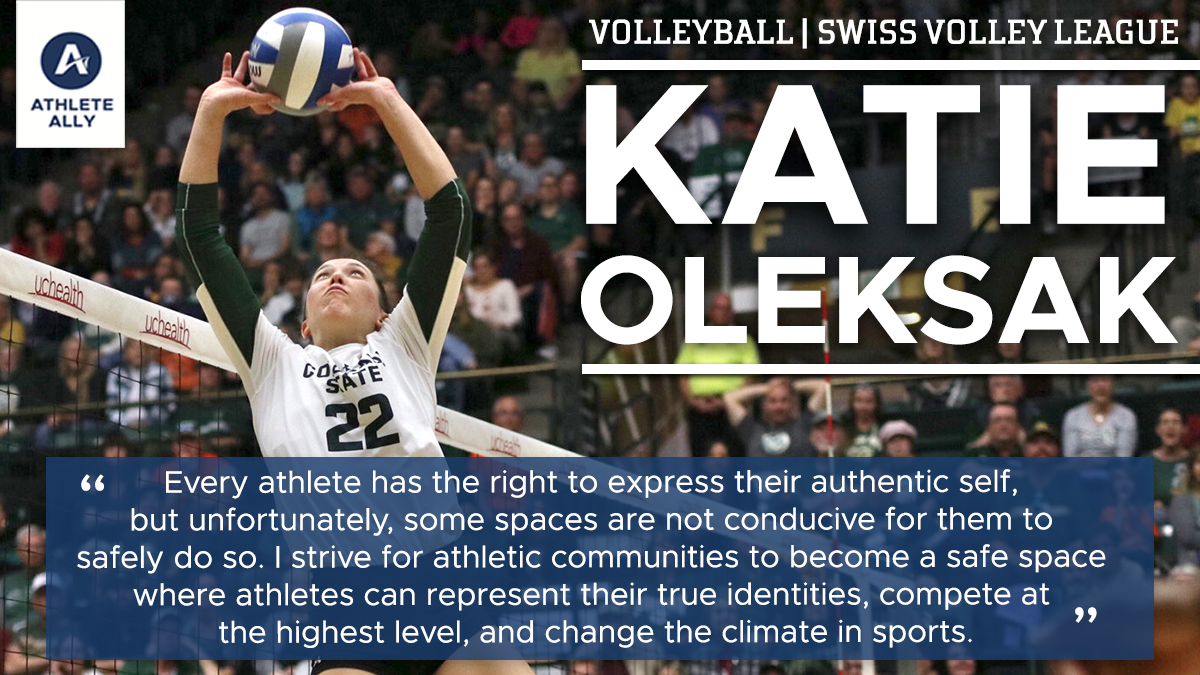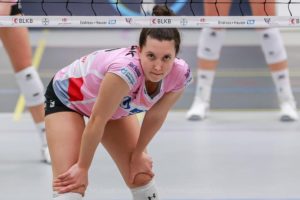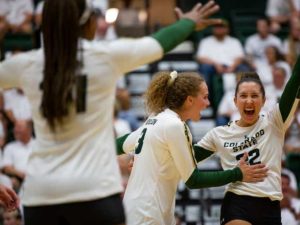Volleyball Player and Coach Katie Oleksak: Finding My Way Through Faith and Authenticity

By: Katie Oleksak, Athlete Ally Ambassador, volleyball player & coach
My name is Katie Oleksak, I am an out queer former professional volleyball player and current Graduate Assistant Coach at the University of San Diego. Today, I’m joining Athlete Ally as an Ambassador to help create a safer community for other queer athletes in this sport to feel accepted.
Unlike some other sports, women in volleyball are pressured to present as very feminine, and there is a lack of public LGBTQI+ representation. This creates a culture of isolation when someone might not want to come out to their team, because it could defy the norm. I remember early on feeling this pressure. When I was thirteen, my coach ridiculed me for wearing basketball shorts instead of spandex. Afraid to be made fun of again, I went home and bought more spandex to conform to the culture of the team.
As I grew older in college, I had several queer teammates, but it still took me awhile to feel comfortable being out. “Locker-room culture” definitely played a role in making me apprehensive to speak up. I experienced a constant fear that if I came out to good friends, that they would think I was attracted to them. I was nervous that sharing my own identity would compromise the comfort of my teammates.

Once I was playing professionally in Switzerland, I was the only out LGBTQI+ player. I felt overwhelmed with the changes of being in a foreign country, along with the pressures of sharing my identity. It wasn’t until I found a group of other queer American volleyball players within Switzerland called “VolleyGays” that I started to become more confident in my own identity. This was monumental in my growth as a LGBTQI+ athlete.
During this time, I often relied on prayer and community to get me through the grind of practices and season. I read Scripture almost daily when I was playing in Switzerland. However, I found that as a Christian, it was hard to see my faith be weaponized against marginalized communities. Like most queer Christians, I felt my sexual identity to be a sin because the church told me it was. I was asked to stop leading Bible studies, I was outed by a friend to someone in my church for dating another woman—it was horrible. So why did I continue to practice Christianity? My faith was so strong that I had no doubt I was loved by Jesus, I was just constantly told by the church that I didn’t belong. It was a societal issue, not a spiritual one.
There are many Christians who rely heavily on their faith community during rough trials in their life, but when sexuality comes up, they are soon isolated and judged. I experienced this in many church environments, and I felt that my only true community did not love me for me, which was shocking. Many people feel that they have to give up their faith, or stay closeted to be accepted by the church (and God). However, there is a place for you.
The intersection does exist, and you can have both faith and your queer identity. There are churches, people, faiths, and organizations that will love you for you. Churches that are truly opening and affirming will mention the LGBTQI+ community and will mention how loved, important, and special you are in God’s eyes. Through the trials of this journey, I realized that I will always pursue my faith while being proud of my sexuality.

Today, I’m proud to work with student athletes as a coach and to help them see that everyone deserves a safe place in sports. Fostering an inclusive athletic space, from the locker room to the court, is crucial for athletes to feel comfortable expressing their authentic selves. I’ve seen firsthand that intentional and inclusive coaching is hard work, but it is worthwhile. Workshops and awareness of language, inclusivity, and how to create a safe environment should be required. When there is queer representation within a coaching staff, this can provide a safe space for athletes to come out. Changing the coaching culture could improve the mental health issues of athletes. Paying attention to the details of your language and word choice could save a life.
I find there is a lack of conversation happening within collegiate athletics around the intersection of sport and the LGBTQI+ inclusion. Resources like Athlete Ally’s Athletic Equality Index (AEI), which measures LGBTQI-inclusive policies and practices within NCAA athletic departments, and Champions of Inclusion, Athlete Ally’s free, comprehensive online curriculum for coaches on LGBTQI+ inclusion, are incredible tools for athletic leaders, current and prospective students, and alumni.
Now that I am a part of the coaching staff, I strive to increase LGBTQI+ inclusivity at the University of San Diego. I want to start by encouraging our student athletes to create an Athlete Ally chapter. I also plan to attend the Student Athlete Advisory Committee to brainstorm with the students on how to create a more inclusive environment at USD. Although there is a lot of work to do, we all have to start somewhere, and I thank Athlete Ally for letting me use my voice for change.
Photos courtesy of Katie Oleksak.
Want to receive stories like this in your inbox? Sign up here.